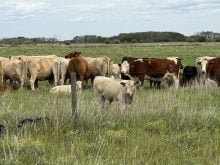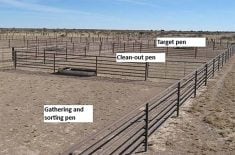Dwindling rye acreage and grain company disinterest has caused an Alberta distiller to set up its own procurement program.
Jim Rogerson, Alberta Distillers director of operations, said starting Aug. 10, the company is offering several delivery options. Farmers may haul the grain direct to the company’s facility in southeastern Calgary or pickups can be arranged.
“We’re hoping to maximize their return on their crop. On the other hand, we’re hoping to guarantee ourselves a consistent supply,” Rogerson said.
The problems leading up to the company’s decision go back decades.
Read Also

Feeder market consolidates at historic highs
For the week ending Sept. 6, Western Canadian feeder cattle markets were relatively unchanged compared to seven days earlier.
Twenty years ago, nearly one million acres of rye were grown on the Prairies.
This spring, just over 212,000 acres were planted, making it the smallest rye crop ever.
Several related factors have contributed to the downward trend, said David Struthers of Winter Cereals Canada.
“It’s the poor second cousin to wheat and barley in the feed trade.”
As milling and distilling demand shrank, marketing became a challenge. In addition, those industries’ high quality demands were difficult to meet consistently, said Struthers.
However, for many farmers the first deterrent was lower prices. Rye typically follows feed barley prices, which for many was not enough incentive to continue growing it.
On July 31, the Alberta Grain Commission reported rye elevator quotes ranging from $138 per tonne at Lethbridge to $59.80 at Grande Prairie.
Declining acreage poses a challenge for companies such as Alberta Distillers that rely entirely on rye to make a variety of aged whiskies and vodkas.
Jeff Kozak, Alberta Distillers grain buyer, links the declining rye acres directly to consolidations among grain companies and disappearance of the wooden elevator system. As a small crop, rye is not always economically feasible to handle in high throughput concrete elevators.
“None of the line companies are interested in moving or sourcing it because it doesn’t really pay the bills on the large concrete facilities,” said Kozak.
“Farmers can’t deliver it to the elevators any more because there is no infrastructure.”
Rye has become a special crop. Farmers store it two or three years at home, watching the price and looking for a buyer. Distillers find themselves competing over a limited crop with the Alberta cattle industry, which takes rye for feed grain, silage and grazing.
All this prompted the company’s decision to switch from buying rye from grain companies to dealing directly with producers.
“We would prefer to source as much as we can from Alberta,” said Kozak.
In the last 10 years the company needed more than the total Alberta crop and had to go farther afield in the quest for grain.
The company accepts rye deliveries off the truck and stores it in eight on-site silos. It grades to Canadian Grain Commission standards and is looking for a number 2 or better. It wants it mould-free with a high starch content to produce alcohol. The distiller’s byproduct, which contains about 25 percent protein, is sold as livestock feed.
The company, which opened in 1946, distills liquor year round except for a short period in early summer when the plant closes for maintenance.
It takes about three days to distill the alcohol and another 10 years until the liquor is aged properly for a premium rye whisky. One bushel of rye makes a dozen 750 ml bottles.
The company is running at about 85 percent capacity. If it could get more rye it would produce more.
It is the fifth largest distiller in Canada and sells 8.4 million 750 ml bottles a year. For that it requires 46,000 tonnes of rye per year.
Brands include Alberta Springs, Alberta Premium, Tangle Ridge and Carrington rye whisky, and several lines of vodka.
About 80 percent of the production is shipped out of the country as unlabelled Canadian whisky. The Americans use some of the Canadian product for Lord Calvert and Jim Beam brands.
Alberta Distillers may be contacted at 403-265-2541.















